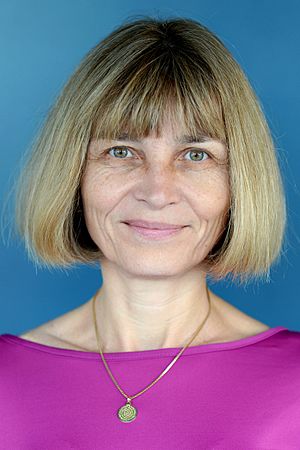Lila Kari facts for kids
Quick facts for kids
Lila Kari
|
|
|---|---|
 |
|
| Citizenship | Romanian; Canadian |
| Alma mater | University of Bucharest, University of Turku |
| Known for | Biocomputing, DNA computing |
| Scientific career | |
| Fields | Computer science |
| Academic advisors | Arto Salomaa |
Lila Kari is a brilliant computer scientist from Romania and Canada. She is a professor at the University of Waterloo in Canada. She is well-known for her amazing work in DNA computing, which uses DNA to solve complex problems.
Contents
Lila Kari's Journey in Science
Lila Kari started her studies in computer science in Romania. She earned her master's degree from the University of Bucharest in 1987. After that, she moved to Finland to continue her education. She received her Ph.D. from the University of Turku in 1991.
In 1993, Professor Kari came to Canada as a visiting professor at the University of Western Ontario. By 1996, she became a full-time professor there. In 2017, she joined the University of Waterloo. She is now a professor of computer science and holds a special research position there.
Exploring DNA and Computers
Professor Kari's early research was about how languages work in computers. But in the mid-1990s, she became very interested in DNA computing. This is a new field that uses DNA molecules to do calculations, just like a computer chip!
How DNA Helps Computers
Lila Kari and her team have done exciting work in this area. They studied how tiny living things called ciliates process their DNA. They found that the way these organisms rearrange their DNA is very powerful. It's like a super-smart computer! This means that DNA can perform very complex tasks, similar to what a regular computer can do.
She also looked at how DNA molecules can build themselves, like tiny LEGO bricks. This process is called self-assembly. She studied how this works and what its limits are.
DNA for Understanding Life
Since the early 2000s, Professor Kari has focused on something called "genomic signatures." Think of a genomic signature as a unique fingerprint for each living thing, found in its DNA. She uses special computer methods to find these signatures. This helps scientists identify and classify different plants, animals, and microbes.
Her methods use ideas like the "Chaos Game Representation" of DNA. She also uses machine learning, which is when computers learn from data without being directly programmed. This helps her team sort and understand huge amounts of DNA information.
One cool use of her work is studying tiny living things called extremophiles. These are organisms that live in extreme places, like very hot or very cold environments. Professor Kari and her team found that the DNA signatures of these extremophiles might also contain clues about the environment they live in. It's like their DNA tells a story about their home!
Awards and Special Recognition
Professor Kari has received many awards for her important work:
- In 1991, she won the Rolf Nevanlinna doctoral thesis award. This was for the best math Ph.D. thesis in Finland that year.
- From 2002 to 2011, she held a special research position called the Canada Research Chair in Biocomputing.
- In 2015, she won the Rozenberg Tulip Award in DNA Computing. This award recognizes amazing achievements in using molecules for computing.

